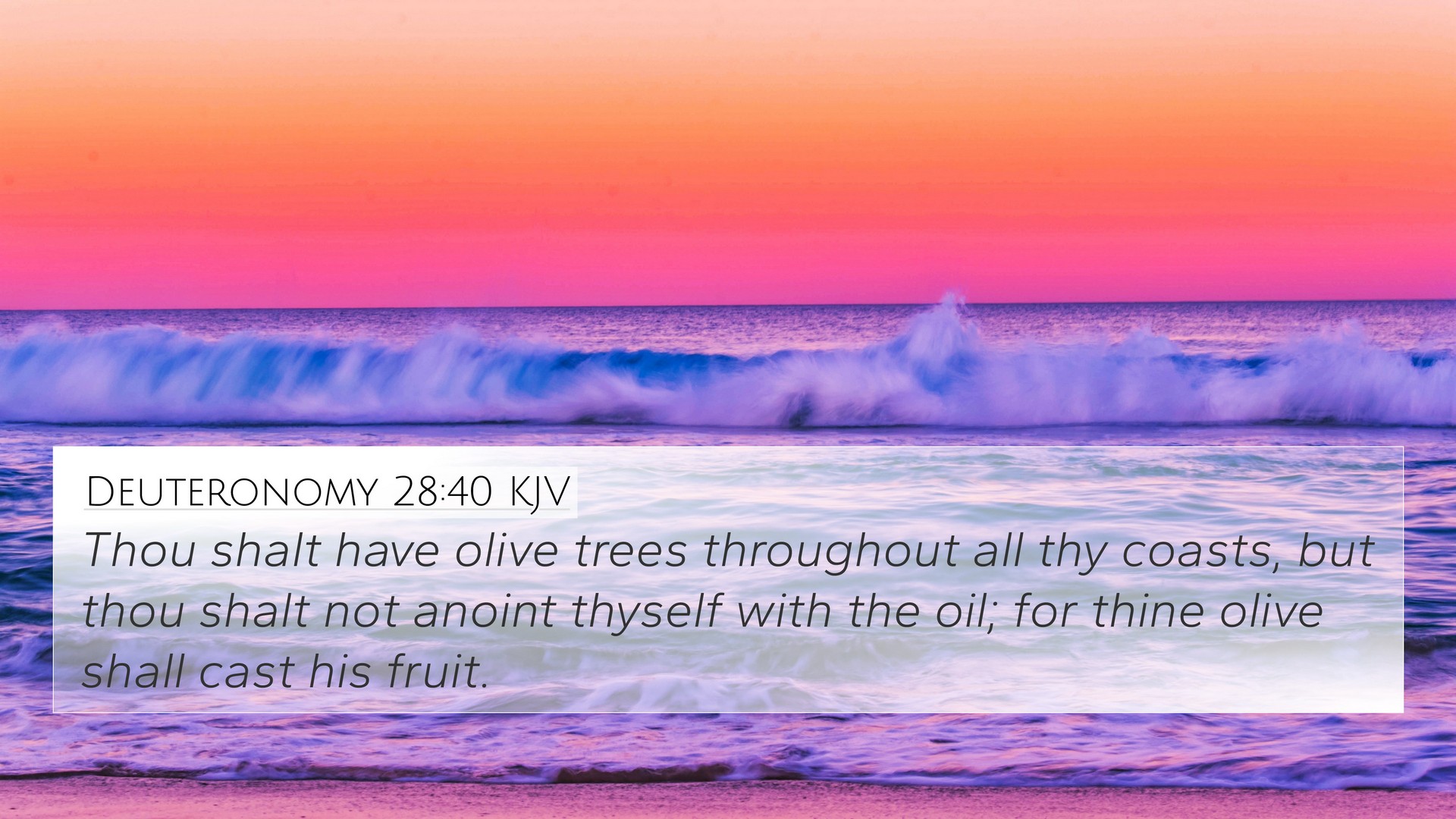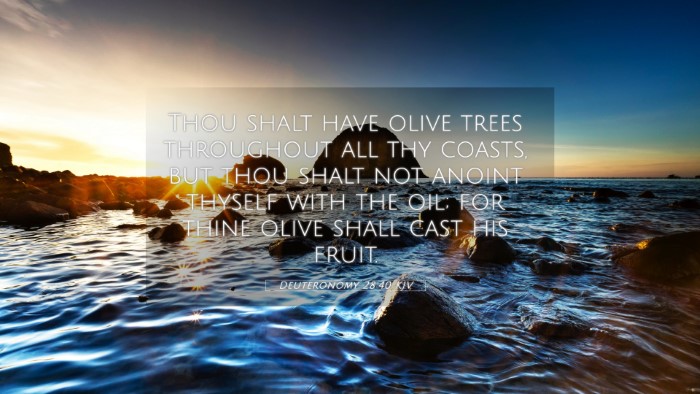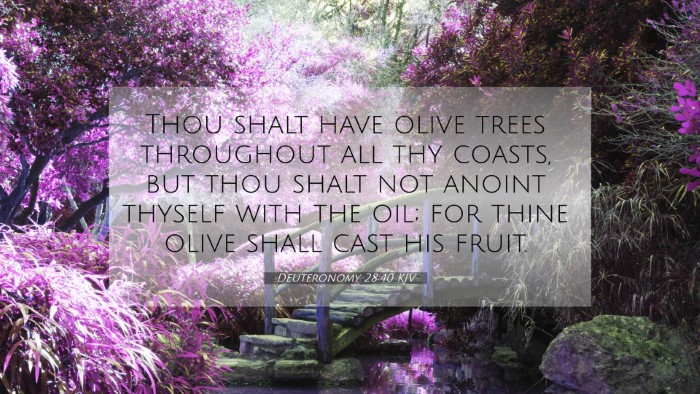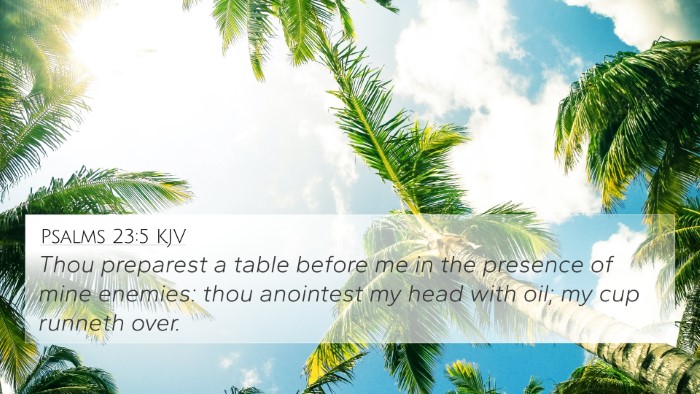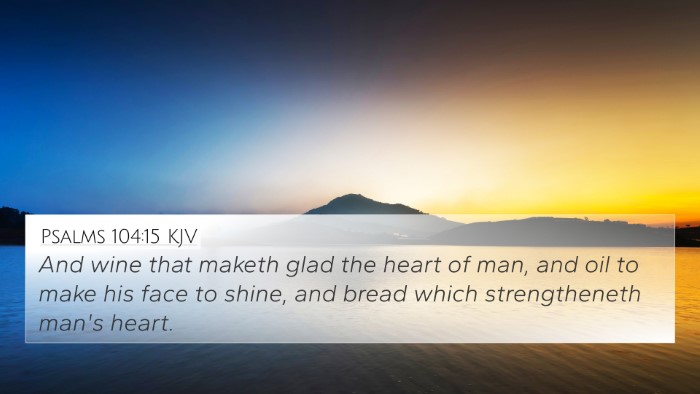Interpretation and Meaning of Deuteronomy 28:40
Deuteronomy 28:40 states, "Thou shalt have olive trees throughout all thy coast, but thou shalt not anoint thyself with the oil; for thine olive shall cast his fruit." This verse is part of a passage that outlines the blessings and curses that would follow Israel based on their obedience or disobedience to God's commands. This specific verse focuses on the consequences of unfaithfulness and serves as a poignant reminder of the forfeitures that accompany the neglect of divine ordinances.
Summary of Commentary Insights
The commentaries from Matthew Henry, Albert Barnes, and Adam Clarke provide a profound understanding of this scripture, elucidating its significance during both the time of Moses and for contemporary readers.
Matthew Henry's Commentary
Matthew Henry emphasizes that this verse highlights the dire consequences of Israel's failure to uphold their covenant with God. He notes that although the land may yield blessings like an abundance of olives, the inability to enjoy them reflects a deeper spiritual loss. The idea of having trees but no oil symbolizes the emptiness of material abundance without the favor of God, echoing a theme prevalent throughout the Book of Deuteronomy.
Albert Barnes' Commentary
Albert Barnes further elucidates this concept by interpreting the olive tree as a metaphor for prosperity. While the Israelites would possess the means for anointing and blessing, their disobedience would rob them of that joy and privilege. He connects this thought with the larger theme of covenant blessings in Deuteronomy, linking it directly to the nation's integrity towards God’s commandments.
Adam Clarke's Commentary
Adam Clarke examines the horticultural aspects of the olive tree, noting its significance in the agrarian society of Israel. He highlights that, during peace, olive oil was symbolic of joy and anointing for service. Thus, the loss of the ability to partake in its benefits due to disobedience illustrates a disconnect from the blessings that God desires to bestow upon His people. Clarke emphasizes the importance of spiritual adherence to fully realize the blessings promised to the nation.
Cross-References and Thematic Connections
This verse resonates with several other scriptures, showcasing the thematic connections related to blessings and the consequences of disobedience. Here are key cross-references:
- Leviticus 26:16 - Discusses the curses that come from disobedience to God.
- Isaiah 24:7-13 - Describes the desolation that befalls a disobedient land, with loss of harvests.
- Jeremiah 2:21 - Illustrates the loss of potential as a fruit-bearing tree due to unfaithfulness.
- Hosea 2:8 - Speaks of the betrayal of God’s gifts through idolatry.
- James 4:3 - Discusses prayers that are hindered by poorly directed desires.
- Galatians 6:7 - Warns that one reaps what one sows, connecting to the consequences of moral actions.
- 1 John 1:6 - Emphasizes walking in darkness despite claiming fellowship with God, which mirrors the loss of blessings in Deuteronomy.
The Importance of Cross-Referencing Biblical Texts
Cross-referencing biblical texts provides deeper understanding and context to scripture, allowing readers to see the interwoven themes throughout the Bible. Tools for Bible cross-referencing, such as concordances and cross-reference guides, are essential for exploring these connections. By finding links between Old and New Testament scriptures, believers can enrich their study and meditation on God’s Word.
Understanding these connections encourages believers to engage in comprehensive Bible studies that delve into thematic parallels. It also aids in the preparation of sermons and teachings as pastors and leaders seek to convey God’s truths effectively. To effectively utilize cross-referencing, readers should become familiar with methods of finding relevant passages.
Conclusion
In conclusion, Deuteronomy 28:40 is not merely a historical note but a living word that calls attention to the realities of obedience in faith. The insights from respected commentators illuminate our understanding, whilst the inter-Biblical dialogue enriches our grasp of God's covenants and promises. By studying these connections, we cultivate a comprehensive view of biblical narratives that emphasize the importance of adhering to spiritual principles.
As you dive deeper into understanding this verse, consider regularly practicing cross-referencing to uncover broader themes and connections across the scriptures, ensuring a more profound appreciation of the biblical text.
